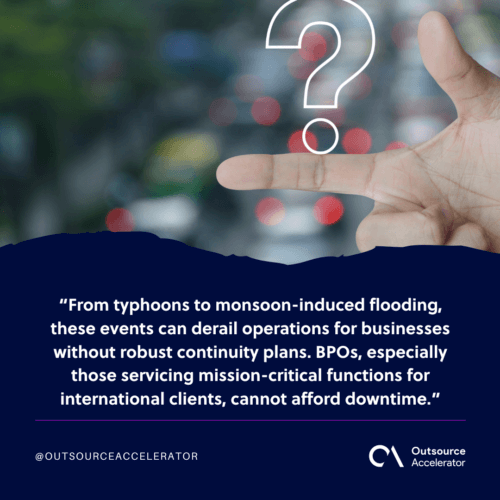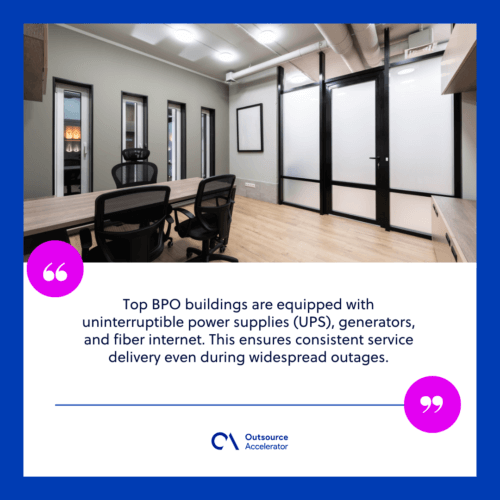The Philippines BPO advantage: Ensuring business continuity through extreme weather

The Philippines has long been a preferred destination for global business process outsourcing. This is due to its large English-speaking workforce, cultural compatibility with Western markets, and competitive cost structure.
However, one unavoidable aspect of doing business in the country is its vulnerability to natural disruptions, particularly extreme weather. With a monsoon season that brings frequent flooding and typhoons, ensuring business continuity is both a challenge and a core competency for BPO operators in the region.
In a recent conversation on the 550th episode of the Outsource Accelerator Podcast, Dale Pearce—COO and Co-owner of Platinum Outsourcing—shared firsthand insights on how his firm maintains operational stability even during severe weather events in Metro Manila.
The challenge for BPO business continuity: Navigating the Philippines’s weather reality
Weather-related disruption is not a rare occurrence in the Philippines.
From typhoons to monsoon-induced flooding, these events can derail operations for businesses without robust continuity plans. BPOs, especially those servicing mission-critical functions for international clients, cannot afford downtime.
Dale pointed out that during the recording of the podcast, Metro Manila was under significant weather pressure: “We’re getting the first big weather event of the monsoon season. The whole of the National Capital Region is under an extreme flood advisory.”
He emphasized the paradox of scale in the industry: while massive office parks host some of the world’s biggest outsourcing firms, they operate in an environment prone to climate extremes.
“It’s amazing that you have a place like Manila that’s so exposed to natural disasters,” Dale noted, “and we have all of these huge office parks running support services for some of the largest companies in the world.”
Despite the inherent risks, the industry continues to thrive—thanks to tested and continually refined business continuity measures.

5 Proactive strategies for business continuity in BPO
BPO firms in the Philippines can’t afford to take a reactive stance when it comes to weather-related disruptions. Effective business continuity planning (BCP) requires proactive, multi-layered strategies.
Here are the key measures implemented by operators like Platinum Outsourcing:
1. Centralized office-based continuity
Instead of defaulting to remote setups during bad weather, Platinum prioritizes getting staff safely into the office.
“We try to get people into the office,” says Dale. “We know that they’re going to have power, they’re going to be dry, and we’ve got the facilities for them to work from where it’s safe.”
Offices are often better equipped than homes in flood-prone neighborhoods.
2. Company-provided shuttle services
Transportation becomes a major challenge during heavy flooding or typhoons. To overcome this, Platinum coordinates private shuttle services across strategic pickup points.
“We do collections from a variety of different points across Manila… with drivers and everything like that,” Dale shares. This reduces employee travel risk while ensuring staffing continuity.
3. Pre-scheduled shifts and early mobilization
In anticipation of extreme weather, many BPOs schedule shifts and office attendance in advance of the worst weather conditions.
Pre-positioning essential staff and avoiding last-minute absences helps them reduce the operational impact of government-declared transport suspensions or class cancellations.
4. Redundant power and internet backups
Most top-tier BPO buildings in Metro Manila are equipped with backup generators and redundant internet connections. While not directly operated by BPOs, these infrastructure partnerships are part of strategic site selection and are considered a proactive continuity asset.
5. Flexible role-based work arrangements
While centralized operations are preferred, some roles can continue remotely—but only if conditions allow.
For instance, a developer may work from home if their home setup is secure. However, as Dale notes, many employees’ homes are “in floodplains” and susceptible to brownouts or poor connectivity, making office setups the safer choice.
Infrastructure and technology as enablers in BPO business continuity
Infrastructure choices and digital readiness play a critical role in whether BPO operations remain uninterrupted during extreme weather.
Here’s how leading firms use infrastructure and technology to support continuity:
1. Strategic site selection
Platinum Outsourcing chose Alabang’s Filinvest Corporate City for its infrastructure resilience.
“We’ve committed to Alabang as the home of our business… We’re now operating out of Asian Star building in Filinvest,” says Dale. This area offers flood-resistant design, reliable utilities, and proximity to secure transport routes.
2. Reliable office power and connectivity
Top BPO buildings are equipped with uninterruptible power supplies (UPS), generators, and fiber internet. This ensures consistent service delivery even during widespread outages.
These redundancies eliminate downtime caused by brownouts that frequently affect residential areas during storms.

3. Cloud-based operations
BPOs are increasingly leveraging cloud-based platforms for communication, task management, and data storage. This allows seamless switching between office and remote setups when needed, as long as employees have the right hardware and connectivity.
4. AI-enhanced systems
Though still evolving, AI is beginning to play a role in continuity—particularly in customer support functions.
For example, intelligent routing and chatbot-assisted triaging can lighten the load on human agents during short staffing periods caused by weather disruptions.
5. Real-time communication protocols
To ensure alignment during emergencies, BPOs implement internal alert systems and rapid-response communication protocols (e.g. SMS alerts, Slack updates, email blasts).
These keep staff informed of transport arrangements, shift updates, and safety instructions in real-time.
The human element of BPO business continuity
While technology and infrastructure play critical roles, the real backbone of business continuity in the Philippines is its people. Filipino BPO workers are widely respected for their adaptability, commitment, and resilience—qualities that are magnified during difficult conditions.
Dale expresses deep admiration for his team. “Just a shout-out to the Filipino staff that go through this every year. They’re so resilient. The fact that they turn up every day when these things are going on… I think it’s a testament to their work ethic.”
That dedication enables clients abroad to experience little or no disruption, even when parts of Metro Manila are under water.
This combination of planning, infrastructure, and human grit is what makes the Philippines BPO sector a reliable global partner, regardless of external factors.
Despite the few times where they have to work in less-than-ideal situations, many outsourcing firms still take the initiative to provide a positive social impact. Stay tuned for the Outsourcing Impact Review 2025 and nominate your BPO now!







 Independent
Independent




